Our customary look-back at the past year provides a mix of triumph and controversy; tragedy and humour, with a few heroic acts.
Controversy in the outdoors is nothing new and in January, the John Muir Trust condemned one of many windfarms planned for Britain’s uplands.
The 33-turbine Dunmaglass installation in the Monadhliath Mountains could set the stage for further developments, it said, and could lead to the death of up to 11 golden eagles.
Two Everest summiteers, the Poet Laureate and the Archbishop of Canterbury were among leading public figures slating the Government’s proposed sell-off of large tracts of English forests – a New Year headache and hangover from the coalition’s decision the previous November.
Archbishop Rowan Williams signed the letter, along with Poet Laureate Carol Ann Duffy and Everest mountaineers Sir Ranulph Fiennes and Annabelle Bond, which said: “We, who love, use and share the English forests believe that such a sale would be misjudged and shortsighted.”
Highland Council planners gave the go-ahead for three enclosures on the estate originally planned to house wolves. But the pens on the Alladale estate, belonging to MFI furniture-chain heir Paul Lister’s family trust, were part of a scaled-back application to house only European elk, bison and wildcats.
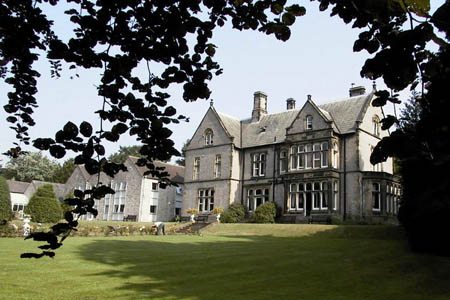
Losehill Hall
The Peak District National Park Authority announced its learning centre Losehill Hall had been sold to the Youth Hostels Association, leading to job losses, though YHA pledged to continue learning sessions at the hall near Castleton, which was built in 1882 as a private house.
It became a holiday and education centre for the Co-operative Society in 1952, and the former Peak Park Planning Board took it over as a national park study centre in 1970.
In the first of a number of setbacks for the company, Blacks Leisure announced takeover talks for the troubled High Street retailer had fallen through. A statement said: “The board has terminated these discussions to allow management to focus all of its efforts on completing the final stage of the turnaround plan.”
Another takeover not going to plan was the Soteria Consortium’s bid to run the search and helicopter rescue service. The plans collapsed following news of irregularities in the bid process for the £7bn contract.
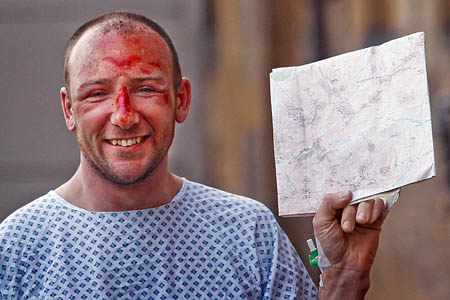
Adam Potter recuperating in hospital. Photo: PA
One man celebrating his amazing good fortune, albeit after a slice of bad luck, was 36-year-old Adam Potter, who survived a 1,000ft fall from the summit of Sgurr Choinnich Mòr in the Grey Corries and was found by the helicopter crew standing up consulting his map and trying to work out how he got there.
By May, he had recovered enough to climb Everest, successfully summiting the world’s highest peak.
In February, with the coalition Government’s 31 per cent cuts biting, the Yorkshire Dales National Park Authority announced a consultation on a series of job losses, reductions in guided walks and recreation activities for youngsters.
Conservative chair of the authority Carl Lis said: “This reduction in our budget has meant that we have had to rethink drastically our role now and in the immediate future and, unfortunately, it will mean staff redundancies and the scrapping of some of the work we do so that we can continue to provide our key services to a high standard.”
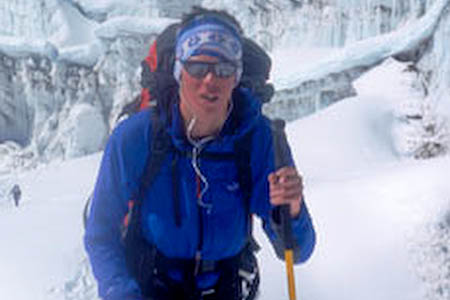
Ed Farrelly
A 19-year-old student announced plans to become the youngest Briton to summit the world’s highest mountain. Ed Farrelly could trace his Everest connection back to 1953 when his great great uncle gave his car pennant to Tenzing Norgay who held it aloft on the summit.
His climb would be thwarted by frostbite, but he vowed to try again in 2012.
A mountain rescue team member who also founded the Nevisport retail chain and pushed for the development of the Nevis Range skiing facilities on Aonach Mòr was given the Scottish Award for Excellence in Mountain Culture.
Ian Sykes, a member of the Lochaber Mountain Rescue Team, was appointed an MBE in 1990 for his services to sport and mountain rescue. A resident of Fort William, he was described by award organisers the Highland Mountain Culture Association as ‘still a relative unsung hero of skiing, mountaineering and mountain rescue in Scotland’.
Climbing gear manufacturers warned users that inferior Chinese copies of its gear were in circulation, including carabiners and ascenders, which were virtually impossible to tell apart from the genuine articles.
French manufacturer Petzl said: “Petzl is working hard to stop these counterfeits, which put users’ lives at risk, from reaching the market.”
Outdoor enthusiasts announced plans to set up a new walking trail in honour of a national park pioneer.
The John Muir Trail is planned to run from Dunbar in East Lothian to Greenock on the Firth of Clyde and proponents said they hoped it will rival the already established West Highland Way and the Southern Upland Way.
The Youth Hostels Association announced the closure of eight hostels across England, including the Helvellyn hostel at Greenside, Glenridding; the one at Hawkshead in the Lake District, Osmotherley in the North York Moors, and hostels in Newcastle upon Tyne, Salisbury, Arundel and Totland Bay on the Isle of Wight as well as the Derwentwater hostel at Barrow in the Lake District, prompting a campaign to keep it open.
But the YHA said it is investing more than £30m in its properties over the next five years, including major refurbishments at the isolated Black Sail hostel in Ennerdale. A new hostel will open at Berwick upon Tweed and the accommodation in Oxford Street in London will be redeveloped.
Buyers for the Kendal and Thorney How, Grasmere, hostels were found to enable them to continue operating.
A statement from the organisation, which was formed in 1930, said: “Closing a youth hostel is never easy and YHA does understand the impact this decision will have, particularly for members and guests who enjoy close links and have strong loyalties with this particular hostel.”
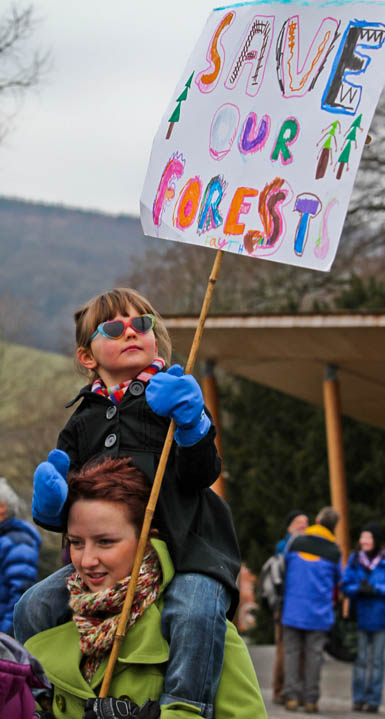
The u-turn followed mass protests against the sell-off
Outdoor campaigners gave a cautious welcome to the news that the Government had abandoned plans to sell off England’s public forests.
Environment Secretary Caroline Spelman told the House of Commons the sell-off had been axed.
She said the relevant clauses of the Public Bodies Bill that would allow the Secretary of State to sell off Forestry Commission land would be removed and an independent panel would be set up to look at the future direction of policy and the role of the Forestry Commission.
Open Spaces Society general secretary Kate Ashbrook said: “At last the Government has seen the trees for the wood.”
The Foreign Office advised mountaineers not to travel to Europe’s highest mountain after three tourists were shot dead by terrorists
Militants dressed as police officers also blew up a cable car pylon on Mount Elbrus, causing some of the cars to crash to the ground, though no-one was injured.
Organisers announced veteran British climber and mountaineer Doug Scott would receive a lifetime contribution award at this year’s Piolets d’Or.
The event, held in the Alpine resorts of Chamonix and Courmayeur, are viewed as the ‘Oscars’ of mountaineering.
A statement from the Piolets d’Or organisers said: “Doug Scott embodies the spirit of modern alpinism in its quest for innovative routes.”
An outdoors star of a different kind made an appearance in a short video produced to promote the Fort William area as the country’s outdoors capital.
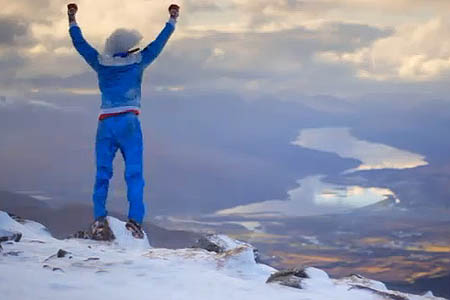
'Sir Jimmy' tops out in Lochaber
Sir Jimmy Savile, or at least some astonishing shellsuit-clad stunt doubles, performed white-water kayaking, skiing, stunt biking and ice climbing while the real Sir Jim sat in an armchair commentating on the opportunities in the area. It would, of course, be his last appearance in any such video.
Walking celebrity Julia Bradbury announced she was expecting her first child.
The 40-year-old presenter of BBC’s Countryfile, who also boosted the Lake District’s popularity with her Wainwright’s Walks series, described the news as a ‘wonderful surprise’ for her and her 52-year-old partner Gerard Cunningham.
In August, she gave birth to Zephyr, a baby boy and – a bit of a miracle – for a woman who had endometriosis, which can lead to infertility.
In March, two illegal off-roaders in Land Rovers smashed through drystone walls in the Yorkshire Dales to escape police, leading to the stepping up of patrols in the area, near Settle.
Sergeant Stuart Grainger from North Yorkshire Police said: “Offenders risk substantial fines and having their vehicles confiscated.”
Mountaineering Council of Scotland officer Mike Dales suggested a solution to the contentious matter of changing to permanent British Summer Time. He put forward the idea of keeping Greenwich Meantime and BST, but altering the date the clocks change.
His proposal was to alter the dates the clocks change to, say, the first weekend in November and the third weekend in February.
That way, he said, the citizens of Scotland would keep their slightly lighter mornings in the deep mid-winter, but we could all enjoy more time to get off the hill in the evening.
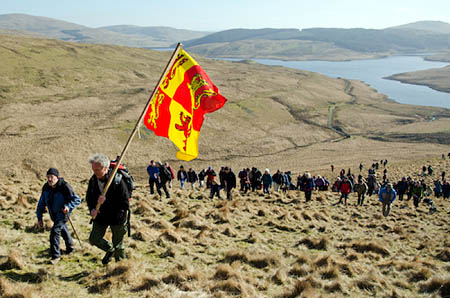
Walkers climb to the rally. Photo: © Tom Hutton
There was more opposition to windfarms when more than 250 walkers followed writer and climber Jim Perrin on to a Welsh mountain to protest at plans to build 64 wind turbines.
The rally was held in the foothills of Pumlumon in the heart of the Cambrian Mountains and drew participants from as far away as Greater Manchester, with Perrin riding to the event on horseback.
Perrin told the crowd: “Nowhere better epitomises resistant Welsh nationhood than the wild landscape of Hyddgen. It is here that we hope to make our stand against the depredations upon Welsh landscape by heedless, ill-considered government. May the spirit of this place impart its strength to us; and may we in our turn, help preserve it undiminished by threatened environmental atrocity.”
The Harris crag Sròn Uladail was the site of more adventure following its previous appearance during the live television broadcast of Dave MacLeod and Tim Emmett climbing the imposing overhang.
This time, it was Leeds-based Base jumper Simon Brentford who packed his parachute and headed for Hebridean isle to make the first known leap from the top of the 215m (700ft) outcrop.
“Taking a deep breath, I quietly counted ‘3, 2, 1, see-ya’ and pushed off from the cliff,” he said.
A pair of climbing friends raced each other up the height of Everest, with Tom Lancaster climbing the equivalent height of the world’s highest mountain in 13 hours 25 minutes to beat his friend and rival Jonny Briggs who took a little more than two hours longer – but bagged his own record when he put in an extra leg to set the longest distance climbed on an artificial wall.
The challenge took place at the British Leisure Show in Windsor, with proceeds from the charity event going to Mountain Rescue England & Wales, Heart UK and Amnesty International.
Environment Secretary Caroline Spelman announced Ramblers chief executive Tom Franklin would be on the independent panel looking at the future of England’s forests, in the wake of the huge public protest at the coalition Government’s plans.
Plans for the first section of the English Coast Path were announced: a 30km (19-mile) stretch in Dorset from Lulworth to Portland including a 4m-wide trail throughout its length, with ‘spreading room’ at some locations along its route.
The section, the first to be set up following the passing of the Labour Government’s Marine and Coastal Access Act, is along the coast where the 2012 Olympic sailing events will take place.
There was little progress on other sections of the path.
The first mountain rescue team to be set up in Scotland for 11 years was established on the isle of Lewis.
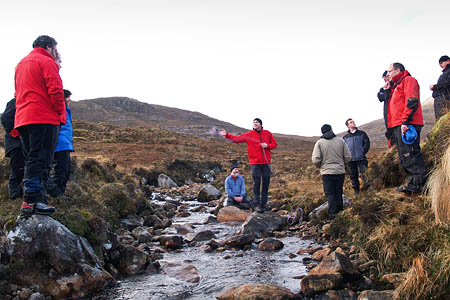
The Hebrides Search and Rescue Team train
The Stornoway-based Hebrides Search and Rescue was established after first being mooted three years ago and covers the outer Hebrides. John Norfolk, manager of Hebrides Search and Rescue, said: “Some time ago the police realised there was a gap in capability with regards to land-based search and rescue.
“We experience some of the worst weather in the British Isles out here and this was also a deciding factor in forming the team.”
More change was on the way for outdoor enthusiasts with the Government’s announcement of the setting up of a new charity to take on the stewardship of Britain’s waterways.
The New Waterways Charity was touted as a ‘National Trust of the Canals’. Welcoming the news, Paul Owen, chief executive of the British Canoe Union, said: “Our inland waterways are a truly special resource.
“The NWC will provide a great opportunity for local communities, especially young people, to come together and get involved with managing and developing their local waterways and the surrounding environments. We are especially looking forward to working with the NWC to encourage more people to get out on the water, and to build a future where everyone can enjoy our waterways for years to come.”
That man Tom Franklin, the Ramblers chief executive, would later be named a member of the new charity’s interim board.
As ever in the great outdoors, there were tragedies as well as triumphs.
In January Ian Walsh, 54, from Preston, Lancashire, died in the Afon Ogwen near Bethesda when his kayak capsized.
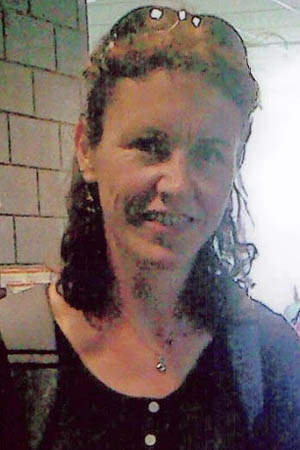
Dr Pearson
A huge search by rescue teams from across the Lake District ended when an off-duty police officer found the body of missing Cumbrian doctor Deborah Pearson in the Whinlatter Forest.
Also in the Lake District, Langdale and Ambleside Mountain Rescue Team and colleagues from Kendal found the body of walker Alison Boyce, 56, from Hornsey Lane, London washed up on the island in the middle of Grasmere lake.
Kayaker Andrew Weatherill of Hartlepool died after getting into difficulties on the River Tyne near Hexham in Northumberland.
In February, the body of Haider Ali Manir, 20, of Worcester was found on Ben Nevis. The walker had a week earlier been attempting Britain’s highest mountain with his cousin who turned back in worsening weather and survived.
A protracted search by mountain rescuers from all over Scotland was frequently interrupted by severe weather.
In March, Cumbrians were shocked by the death of high-profile businessman Mark Weir, owner of the Honister Slate Mine and would-be developer of a controversial zip-wire at the site.
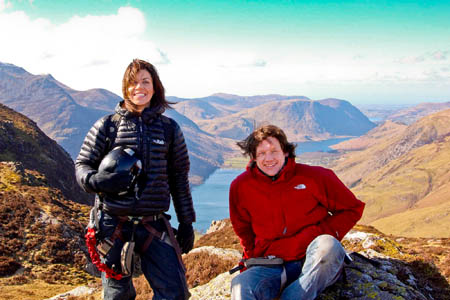
The late Mark Weir with Julia Bradbury
He crashed his helicopter 200m from the mine shortly after taking off to make his way home. The 45-year-old’s body was recovered by members of the Cockermouth and Keswick Mountain Rescue Teams.
Celebrity visitors to Mr Weir’s mine included Griff Rhys Jones, Julia Bradbury, Coronation Street cast members and Top Gear’s Richard Hammond.
Eric Robson, chair of Cumbria Tourism, said: “Mark brought such a spirited dynamism to the debate about creating a thriving tourism economy to the Lakes. He genuinely loved Honister and the community of Borrowdale, he was rooted there and wanted to do the best for them.”
Climber Jonathon Woods died after being struck by a rock while on sea cliffs. He was climbing with his girlfriend at Bosherton Head in Pembrokeshire yesterday when the incident happened.
The 36-year-old Bristol climber was struck on the chest by the rock and was flown to Withybush Hospital in Haverfordwest, but died from his injuries.
The climbing community paid tribute to a former president of the Scottish Mountaineering Club who died in an avalanche in Glen Doll, Angus.
Dougie Lang’s body was found by rescuers after he failed to return from a trip to Corrie the 69-year-old, from Dundee, was also a member of the Carn Dearg Mountaineering Club and was renowned for many first ascents in his rockclimbing career, including the Great Stack of Handa in Sutherland with Hamish MacInnes and Graeme Hunter and the Ardverikie Wall on Binnein Shuas in Glen Spean.
In April, kayaker Samuel John Yarwood, of Poole, Dorset, died after capsizing on Ullswater in the Lake District.
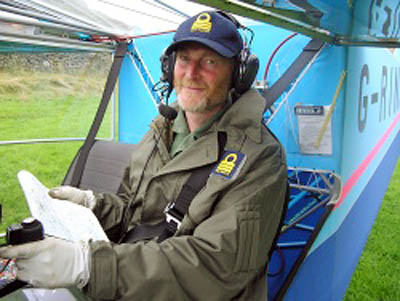
Mr Watt at the controls of one of his aircraft
May saw the death of a mountain rescue volunteer when his light aircraft.
David Watt, 64, died when the aeroplane he was flying crashed in a field near his home at Ladthwaite, Hartley, Kirkby Stephen.
Mr Watt, a retired dentist, had been a member of the Kirkby Stephen Mountain Rescue Team for 30 years and was a search and rescue dog handler.
In June, tragedy struck on Skye when Tessa Cousins, 56, of Cape Town, South Africa died after being hit by falling boulders when belaying a lead climber on Cioch Direct route on Sròn na Cìche.
And French student Arnaud Albagnac, 22, from Aveyron, died after getting into difficulties on the zigzags above Lochan Meall an t-Suidhe on Ben Nevis.
Despite being in the height of summer, rescuers said conditions on the mountain that day were ‘pretty much full-on winter’.
In July, retired 63-year-old headteacher William Johnston went missing while walking in the Glen Shiel area. His body was found by Kintail Mountain Rescue Team in Am Fraoch-choire beneath Creag nan Damh.
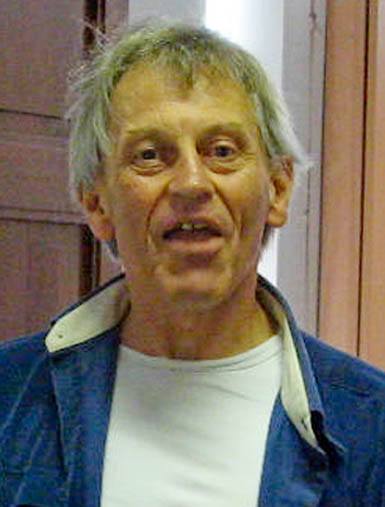
Rodney Legg
A tireless champion of walkers’ access rights lost his battle against cancer.
Rodney Legg, a former chair of the Open Spaces Society, died aged 64.
His former colleague Kate Ashbrook, general secretary of the society, described Mr Legg as a rebel campaigner with a national reputation.
In August William Bingley, 61, of Caton near Lancaster died after falling into Rawthey Gill near Baugh Fell in Cumbria while walking with his wife.
Mr Bingley was one of the country’s leading authorities on mental-health law and a life-long advocate of the National Health Service and human rights.
A young explorer died after being mauled by a polar bear on the Von Postbreen glacier on Spitsbergen, the largest island on the Norwegian Arctic peninsula of Svalbard.
Eton College student Horatio Chapple, 17, was with a party from the British Schools Exploring Society when the attack happened.
Four others were injured in the incident.
A leading mountaineer who was instrumental in establishing the right to roam in Scotland succumbed to cancer at the age of 78.
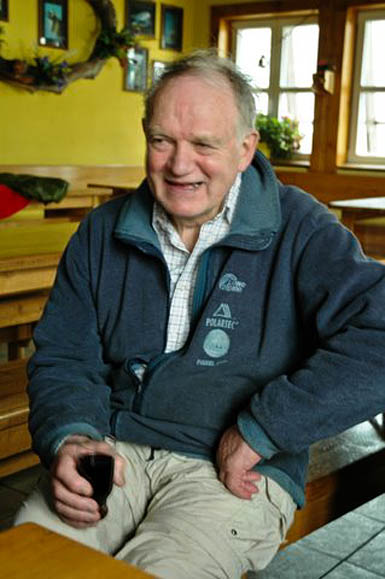
Alan Blackshaw. Photo: Robert Pettigrew
Alan Blackshaw was a past president of both the British Mountaineering Council and the Alpine Club
Mr Blackshaw, who had non-Hodgkin’s lymphoma, was also a former president of the Union Internationale des Associations d’Alpinisme, the worldwide body representing mountaineers.
Police divers found the body of 37-year-old David Donnelly in the River Leny close to the makeshift campsite where was last seen.
August also saw the departure of one of British mountaineering’s great names.
George Band was the youngest climber in the team that included Tenzing Norgay and Edmund Hillary, who went on to summit the world’s highest peak in 1953.
He died, aged 82, at his home in Hampshire.
In September, the head of outdoor learning at the National Trust’s Stackpole centre in the Pembrokeshire Coast national park died in a climbing accident.
Experienced 32-year-old Louise Smithson died after she fell from a route in Barafundle Bay.
Canoe instructor Grant Kinnie, 25, of Darlington, died after an incident on a Cumbrian river.
He passed away in the Royal Victoria Hospital, Newcastle, after being airlifted from the scene on the River Eamont at Sockbridge Mill near Penrith.
Mr Kinnie was a freelance outdoors instructor working for Patterdale Hall Outdoor Education Centre, Glenridding, owned and run by the independent Bolton School in Greater Manchester.
A charity cyclist died after hitting a wall in the Yorkshire Dales.
Kim Caplin, of Martlesham Heath, Ipswich, was with a party of 16 cycling from Land’s End to John O’Groats when the accident happened.
The 40-year-old was travelling from Ingleton to Dent when the collision occurred in Deepdale, near Dent.
Walker Patricia Hutchison from Glasgow died following a fall in the Lost Valley, Glencoe. Glencoe Mountain Rescue Team recovered the 58-year-old’s body.
Renowned fellrunner and writer Bill Smith perished on the bogs of the Bowland fells. A passing walker discovered his body in October on Saddle Fell, but police said he might have lain there for three weeks.
Mr Smith was best known for his 1986 book Studmarks on the Summits – A History of Amateur Fell Racing 1861-1983. He had recently been made an honorary member of the Clayton-le-Moors Harriers.
Climber Tom Clark, 65, of Aberdeen, died after falling from the hills above the Cluanie Inn.
Kintail Mountain Rescue Team recovered the graphic designer’s body after he was reported missing.
One-time Glencoe resident and unlikely friend of the outdoors Sir Jimmy Savile died in October.
He was a regular contestant in the race up Scotland’s highest mountain and also starred in the short promo film for Fort William and its outdoor activities.
In December, Martin Coleman, 36, from the village of Bodfari, Denbighshire, fell 150m (500ft) to his death when a cornice collapsed on the summit of Y Garn in the Glyderau, pitching him into Banana Gully.
Despite the best efforts of a Mountain Guide in the area, Mr Colman’s injuries in the fall proved fatal.
A woman who was also avalanched in the incident escaped unhurt.
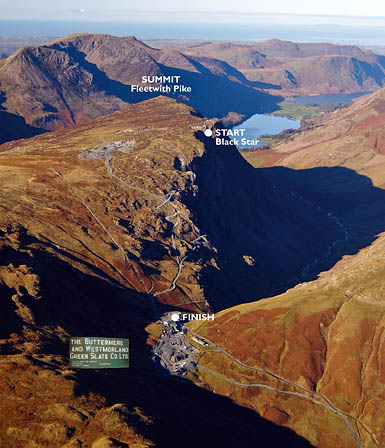
The proposed zip-wire on Fleetwith Pike. Photo: Brian Sherwen Photography
The company running the late Mark Weir’s Honister Mine pledged in April to press on with his plans for the controversial 1.2km-long zip-wire from Fleetwith Pike to the mine.
A Honister spokesperson said: “We know it will not be to everyone’s taste but we would hope they can see that this should be a national park for everyone’s enjoyment.”
London geography teacher Peter Burgess came up with a novel idea of mapping the Lake District fells with his Underground-style diagram of the Wainwrights – the hills detailed in Alfred Wainwright’s Pictorial Guides.
The keen walker devised the colour-coded map of the fells in the style of Tube map designer Harry Beck. Mr Burgess said: “I’ve lived in London for nearly 20 years, although like AW himself, I was born in Blackburn. About 10 years ago I was on the Tube into town and I thought: I could make a tube map to the fells like that.”
Also in April, the chairman of rapidly expanding retailer GO Outdoors stepped down after only nine months in the job.
John Lovering joined the company with a reputation as an expert in private equity and stock market deal-making.
He was formerly chairman of pub group Mitchells & Butlers and retailers Debenhams.
A paralysed man summited the UK’s highest mountain in an effort involving a team of 18 and a trip lasting 12 hours.
Barry West, a tetraplegic wheelchair user made the ascent of Ben Nevis helped by Westy’s Warriors, who dragged, carried, pushed and pulled the 34-year-old through snow to reach the 1,344m (4,409ft) Lochaber summit.
The Nevis ascent was the result of a chance meeting in a pub between Mr West and mountaineer Graeme Morrison, former chair of the mountain safety committee of the Mountaineering Council of Scotland.
Mr West said: “We all knew it was going to be tough, but we may not have realised just how tough.”
The Government’s official radio agency began a consultation on whether personal locator beacons could be used on land.
The devices, previously only permitted on boats and planes, transmit a distress signal to orbiting satellites which then relay it to emergency services.
A decision was promised by November, but the go-ahead was finally announced for 12 January next year.

Warning signs were put up across the national park
National park bosses pleaded with the public to take care after six moorland blazes destroyed large tracts of the Peak District.
Fire warning signs were erected by the national park authority in the run-up to Easter with landowners including the National Trust and United Utilities also posting notices during a particularly dry period.
Still in the Peak District, the national park authority announced it was looking for someone to take over the prime climbing site at The Roaches.
The national park, facing cuts of 28 per cent, looked to offload some of its prime properties to save cash. After selling Losehill Hall to the YHA, the authority would, in November, name the Staffordshire Wildlife Trust to take on a 125-year lease at the site.
The appearance of little white boxes in remote countryside got some walkers hot under the collar.
The Trailblaze scheme was set up by a company to enable runners on routes such as the Pennine Way to punch their tallies in the boxes and record their times. Natural England gave the project its backing.
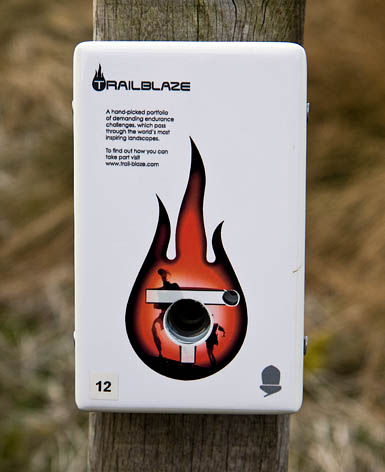
A Trailblaze box on the Pennine Way
But a petition opposing their installation said: “They are ugly, man-made intrusions into our beautiful countryside, and we object to the website advertisement appearing on trail furniture.”
Outdoor Writers & Photographers Guild member Glyn Davies’s two books of Anglesey landscape photographs were chosen by Prime Minister David Cameron’s staff as an official wedding present for the Duke and Duchess of Cambridge.
Mr Davies said: “It is a huge honour that the Prime Minister had thought about my books and artwork in the first place, and that he believes them to be a fitting ‘extra’ gift for a royal couple.”
There were more wildfires in May, as the dry period continued, including a major blaze on the National Trust for Scotland’s land on the Torridon estate and in Kintail and Morvich.
And the Met Office confirmed April was the driest on record with only half the average rainfall across the UK.
Temperatures across the UK were 3C to 5C warmer than normal, with an average of 10.7C, the warmest for 100 years, beating the previous high of 10.2C set in 2007.
Chief executive Neil Gillis stepped down from the ailing Blacks Leisure group, with Julia Reynolds of lingerie group Figleaves.com taking over.
Two mountain rescue team members were joined by Everest summiteer and elder statesman of British mountaineering Sir Chris Bonington for part of their walk across England.
Judy Whiteside and Gail Todd completed the 309km (192-mile) Coast to Coast Walk to raise funds for a new benevolent fund for England and Wales’s volunteer mountain rescue team members.
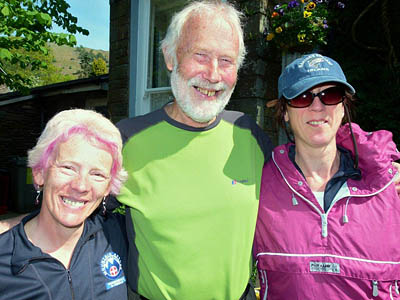
Sir Chris with Gail, left, and Judy
The start of the walk on the Mayday bank holiday Monday coincided with the National Mountain and Cave Rescue Awareness Day. Judy Whiteside said: “To raise our target amount would be fantastic but we’re also wanting to let more people know about the invaluable work of mountain rescue teams.”
Kenton Cool climbed into the record books with his ninth ascent of Everest.
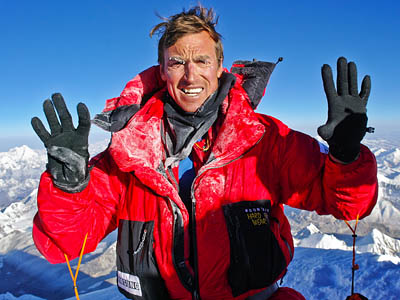
Cool celebrates his ninth summit on Everest
Berkshire-born Cool made an emotional phone call to his wife Jazz and sent the first ever Tweet from Everest’s summit, using a signal from a 3G mobile phone transmitter at the Nepalese base camp in Khumbu.
Also hitting the heights was USA-based Apa Sherpa who climbed Everest for the 21st time.
Apa, 51, began portering for expeditions at the age of 12, following his father’s death, and moved on to high altitude work, making his first successful Everest ascent in 1990.
Less successful was the group of hapless would-be Three Peaks Challenge walkers who took a wrong turn and climbed Stob Bàn, rather than the intended Ben Nevis.
All but two of the six, from Cricklade in Wiltshire, turned back or got lost on their attempt to summit Scafell Pike and the team abandoned its plan to tackle Snowdon, but still raised almost £10,000 for Leukaemia and Lymphoma Research.
One group that did find its way to the top of Ben Nevis was the team of veteran car enthusiasts who carried a Model T Ford to the summit.
The car was taken to the top of Ben Nevis in pieces by 60 people and reassembled to mark the centenary of a similar car being driven to the top of the 1,344m (4,409ft) peak.

Model T owner Neil Tuckett, left, and John Muir Trust chairman John Hutchison on the summit
The original plan was to push the veteran car up the tourist track, or airlift the vehicle in by helicopter, but the John Muir Trust vetoed the idea on environmental grounds. The trust owns most of the summit of the mountain.
A Lakeland rescue team pleaded with walkers not to rely solely on mobile phones to navigate on the hills.
Langdale and Ambleside Mountain Rescue Team said it was dealing with an increasing number of callouts to walkers who got lost because they are using a mobile phone to navigate.
A spokesperson for the team said: “These devices may well work if the right mapping is installed, and the instructions have been fully understood, but otherwise risk being worse than useless.”
Walkers on Scotland’s most popular long-distance trail were warned they faced a £500 fine for wild camping with the introduction of bylaws aimed at curbing anti-social behaviour and rowdyism.
Ramblers Scotland opposed the camping ban on the section between Drymen and Rowardennan, saying: “The police already have powers which do not appear to be fully used and a blanket ban on camping through bylaws seems to us to be excessive.”
George Atkinson became the youngest person to summit the highest peaks on the Earth’s seven continents.
George Atkinson, 16, summited Everest to claim the title, but it would be short-lived, with 15-year-old American Jordan Romero beating the record in December with his ascent of Mount Vinson in Antarctica.
A set of disused railway tunnels in the Peak District was reopened, allowing walkers and cyclists to travel between Blackwell Mill near Buxton and Coombs Road near Bakewell, for a distance of 14km (8½ miles).
The tunnels were officially reopened by three former British Railways workers who were employed on the line when it was in operation.
In June, Louise Ramsay stepped down as chief executive of the Outdoor Industries Association, taking on the communication role with the organisation.
Her place would be taken the following month by keen mountaineer Andrew Denton, a member of the Alpine Club.
A Government inspector settled a 300-year argument when he gave the go-ahead for a motor vehicle ban on a Lake District route.
The Garburn Pass between Kentmere and Troutbeck had been the subject of legal debate since 1717 but would now only be legally open to unmotorised travellers.
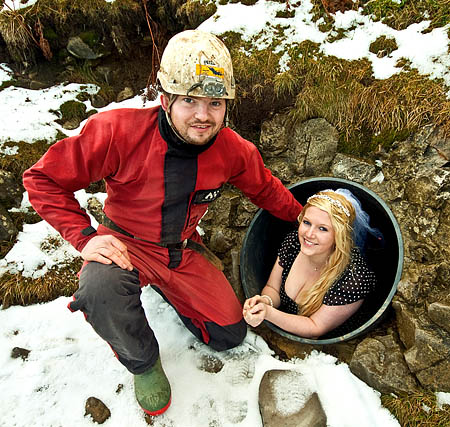
Johnny and Jude, preparing for their underground wedding
Caving enthusiasts announced they would tie the knot deep below ground.
Jude Onions and her partner Johnny Latimer had a wedding blessing in Ingleborough Cave near Clapham in the Yorkshire Dales.
Ms Onions celebrated her hen ceremony by descending with family and friends into nearby Gaping Gill.
Jude met Johnny on a Christmas expedition when their eyes met in the dim light of the sump in Ireby Fell Cavern in the western Dales in 2007. He proposed to her Christmas Eve 2009 after the pair had spent the day on Ingleborough. “He was trying to teach me to snowboard and ski. I spent most of the day on my bottom but it was great fun, I’m always up for trying something new,” she said.
There was a challenge to the famous RAF Red Arrows from rescuers in Yorkshire.
Woodhead Mountain Rescue Formation Stretcher Display Team – the Pith Helmets – enthralled crowds with their daring display of mountain manoeuvres.
Speaking before their first performance, team member Pete Stott said: “We don’t want to give too much away but we are a cross between the Red Arrows and the White Helmets, but without motorbikes or aeroplanes.”
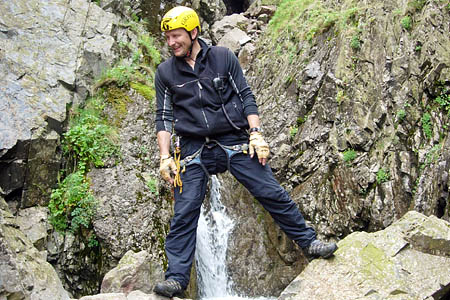
Mike Park
Mike Park, team leader with Cockermouth Mountain Rescue Team, was appointed an MBE in the Queen’s Birthday Honours List.
Mr Park said: “I assume the team put me forward for it, but it’s a team of 40 people and I really feel it’s for every one of them.”
And former Ramblers Cymru director Beverley Penney was appointed an OBE.
She said: “I was so glad to be a part of this growing movement developing walking for the benefit of Wales and honoured that fellow Ramblers put my contribution forward for this award.”
The Ramblers called on ambulance managers to end the postcode lottery that put injured outdoor enthusiasts at risk.
The Ramblers’ 999 campaign highlights the fact that many ambulance control-room staff cannot take grid references from walkers and others in the outdoors who need to summon help.
Chief executive Tom Franklin said: “Walkers and all outdoor enthusiasts have the right to feel secure in the British countryside.”
The Peak District Mountain Rescue Organisation announced plans to give disadvantaged children a day of adventure including climbing and abseiling, mock rescues, cave exploration and high-ropes courses to a mock rescue exercise.
Centrepoint teenagers and Members of the Child Bereavement Charity would also join in the activities at Hope in the Peak District the following month.
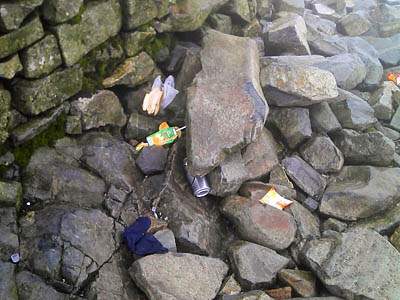
Scafell Pike rubbish, recorded by Paul Cook
Fellwalker Paul Cook complained the summit of Scafell Pike was becoming a dump because large amounts of rubbish were being left there by walkers.
Richard Warren, chairman of Wasdale Mountain Rescue Team added: “We still seem to have problem with people using the summit as a toilet. It’s dark at night so there are plenty of places to go, but when morning comes…”
Mountain rescuers were spared a major search after a fellrunner was found safe and well – in bed.
Langdale and Ambleside Mountain Rescue Team and colleagues from other teams faced a huge operation after the man was reported missing while out on a reconnaissance trip for the upcoming Lakeland 100, a 160km (100-mile) run across the Lakeland fells.
“One of our team went back to where they were staying with his wife and spotted movement under the duvet and there he was,” a team spokesman said.
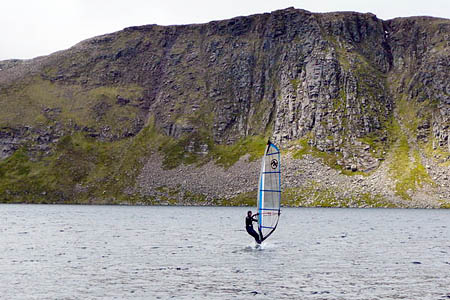
Windsurfing on Loch Etchachan
A group of mountaineers claimed a UK record for windsurfing at altitude.
A team of 11 members made the 30km (19-mile) trek from Linn of Dee to Loch Etchachan, carrying a 3m sailboard, along with an iron and board to keep their wetsuits in ship shape during a stint of extreme ironing.
The loch, 927m (3,041ft) up in the Cairngorms, is the country’s highest sizable stretch of open water.
In July, climbing moved a step closer to getting a foothold on the route to Olympic acceptance.
The International Olympic Committee’s executive board placed sportclimbing on a shortlist of eight sports for consideration for the 2020 games.
The British Mountaineering Council’s chief executive Dave Turnbull gave the news the thumbs-up. He said: “We welcome the news that sportclimbing is in with a chance of becoming an Olympic sport.
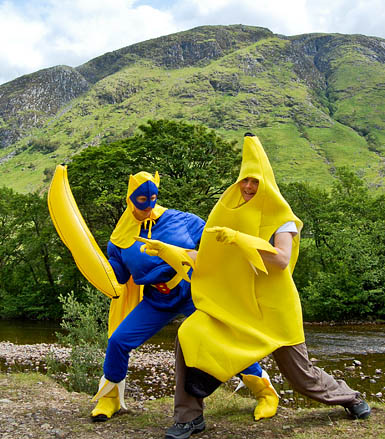
John Muir Trust staff go bananas
Litterbug walkers were driving staff bananas on Britain’s highest mountain.
Conservation officer Sarah Lewis dressed as Bananaman and a colleague is donned a banana suit to get across the serious message to walkers on the 1,344m (4,409ft) peak.
A clean up by volunteers produced 18 sacks of rubbish, with 10 of the bags full of banana skins.
An ultra runner smashed a 17-year-old record in a route across the Lakeland fells.
Dark Peak Fellrunner Nicky Spinks added two extra hills to Anne Johnson’s tally to set a new 64-peak mark in less than 24 hours.
The rules of the challenge meant she had to cover all the previous record holder’s peaks and add extra ones with at least 250ft (76m) of ascent, ¼ mile apart.
Fuelled by bananas, Hula Hoops and energy gels, the Mirfield-based farmer conquered stomach upsets resulting in numerous vomiting episodes to take the record. The route includes a roped climb up Broad Stand between Scafell Pike and Scafell.
A suspect device, the discovery of which paralysed a Yorkshire town centre for three hours, was blown up by the Army – and found to be a geocache.
A controlled explosion in Wetherby set off by an Army robot left pieces of the plastic box and its contents scattered across the street. Residents and business occupiers were allowed to return after the three-hour evacuation.
Chief Inspector Mick Hunter of West Yorkshire Police said: “In placing the caches, what I would say is, please apply some commonsense to where you put them.”
A pair of enterprising walkers set up a cafe on England’s third highest peak.
Brothers Owen and David Holmes served hot and cold drinks to fellwalkers near the summit of Helvellyn in the Lake District.
Bacon sandwiches, cooked on a camping stove, were also on offer to walkers near the top of the route from Striding Edge.
A spokesman for the Lake District National Park Authority said: “As a temporary development it can carry on for 28 days without permission.
“If the guys intended carrying on longer than that they would be advised to talk to our planners about any future planning permission requirements.”
Mountain rescuers criticised two women who told volunteers to ‘come and get them’ when they decided they were too tired to continue.
Ogwen Valley Mountain Rescue Organisation was called by the climbers who were on Tryfan.
Chris Lloyd of the mountain rescue team said: “They were not injured; they were not stuck at that time; the weather was fine and there was enough light for them to be able to make their own way down rather than call out the mountain rescue team at 10pm on a Saturday evening.
“The two ‘casualties’ were ill prepared, had shown no navigation skills, seemed beyond their ability, fitness and stamina and had just expected at 10pm on a fine Saturday evening for the mountain rescue team to ‘come and get them’.”
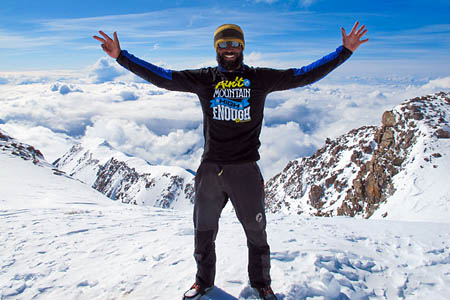
Richard Parks on Elbrus
A former Wales international rugby player who was forced out of the game by a shoulder injury climbed into the record books with an ascent of Mount Elbrus.
Ex-Barbarians player Richard Parks’s successful summiting of Europe’s highest peak set a world record for climbing the highest mountains on each of the world’s seven continents, and the North and South Pole.
He said: “My friends, family and parents have been absolute rocks throughout this journey for me, from my forced retirement in rugby to this challenge; I know I have put everyone through the ringer, I am just grateful to have done it.”
National park bosses vowed to act on the problems caused by off-roaders damaging routes.
The Peak District authority decision came after a rally of more than 100 people at Stanage Edge pressing for protection for the national park’s tracks and green lanes.
A deaf-blind grandfather successfully summited Britain’s highest mountain.
Michael Anderson, a 70-year-old, from Larbert near Falkirk, was accompanied on his trip by his daughter Fiona, her partner, and writer and backpacking enthusiast Phil Turner.
The climb to the 1,344m (4,409ft) summit of Ben Nevis was made to raise funds for Deafblind Scotland, of which Mr Anderson is vice-chair.

The English countryside, at risk according to the National Trust
Coalition Government plans to change English planning laws caused consternation among the ranks of the National Trust’s members.
Business Secretary Vince Cable said: “Along with the powerful presumption for sustainable development, the new approach to planning will be a significant step forward in creating the right conditions for businesses to start up, invest, grow and create jobs.”
But the National Trust said the proposals sounded the death-knell to the principle established in the 1940s that the planning system should be used to protect what is most special in the landscape, creating a tool to promote economic growth in its place.
Dame Fiona Reynolds, director-general of the trust said: “We believe that the town and country planning system, as a whole, has served the country well.”
In August, the long campaign to get financial support for volunteer mountain rescue teams facing increased VAT bills led to the Government announcing a grant of £200,000 to be shared across the UK’s teams.
England and Wales’s teams got £124,000; Scotland’s £68,000 and £8,000 was allocated for Northern Ireland.
A recurring theme was the increasing use of technology to help mountain rescuers find lost walkers.
Patterdale Mountain Rescue Team used a BlackBerry smartphone to help them find a walker who was lost on a fell at the head of Boredale.
The rescue team asked her to take a picture of her location which she then emailed to them.
She was found safe and well and accompanied off the hill.
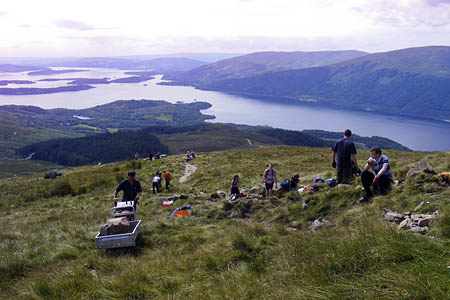
The workers on Ben Lomond
Hillwalkers on a popular Scottish munro were praised for their honesty.
The National Trust for Scotland said walkers tackling Ben Lomond had shown heart-warming generosity after volunteer workers mistakenly left a donations tub on the mountain – only to find it was still there days later, but contained even more money.
There was more woe for the operators of the late Mark Weir’s via ferrata. Honister Slate Mine faced a bill of more than £28,000 after installing an unauthorised extension.
West Cumbria Magistrates ordered the company to pay a fine of £15,000 and costs of £13,190 costs plus a £15 surcharge. The court heard the extension to the route, modelled on similar installations in the European Alps which allow climbers to use a lanyard as protection as they climb the fixed steps, rungs and bridges across routes that only rock-climbers can usually access, had damaged a site of special scientific interest.
Elsewhere, national park bosses have appealed to the public not to launch Chinese lanterns which are causing problems in the countryside.
The plea came from the Yorkshire Dales National Park Authority after reports the flaming paper lanterns were causing a fire risk and leading to false alarms for mountain rescue teams.
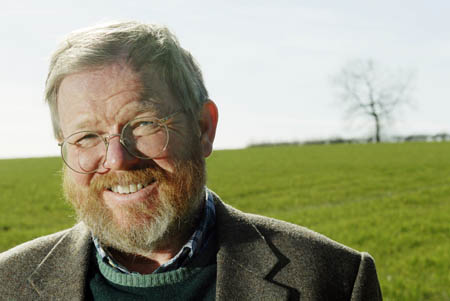
Bill Bryson
An Iowa-born journalist and author was honoured for his work in protecting the British countryside.
Bill Bryson, once described as the world’s number-one anglophile, was the recipient of the Golden Eagle Award from the Outdoor Writers and Photographers Guild.
OWPG president Roly Smith said: “Although Bill is perhaps best known as a very funny travel writer, I don’t know anyone who is more in love with the British countryside, and who campaigns more vigorously to protect it.”
British ultrarunner Lizzy Hawker repeated her victory in one of Europe’s toughest races.
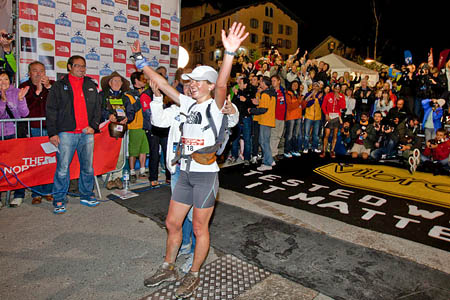
A victorious Lizzy Hawker
The British athlete was first woman home in the gruelling Ultra-Trail du Mont Blanc shortly in the early hours of Sunday, repeating last year’s win and posting her fourth victory in the event.
She crossed the line in Chamonix 25 hours after starting the event, which crosses three countries – France, Italy and Switzerland – on its 170km (106-mile) route, with 9,700m (31,824ft) of ascent.
We reported on the controversy surrounding plans to do away with the Adventure Activities Licensing Authority, established after the Lyme Bay kayaking tragedy of 1993.
Teaching union the NASUWT said: “Abolishing the AALA and replacing it with a code of practice is, in the view of the NASUWT, a reckless and regressive step, demonstrating a lack of understanding of the responsibilities that schools and colleges have.”
The father of Andrew Lucas, who died on an overseas trek, also questioned the rationale for abolishing AALA. “With regard to the AALA, we have little direct experience of the organisation, but it seems to be effective at what it does – albeit with a limited role. It does not cost much to run and we have never seen any evidence to support the case that its abolition will advance the cause of safety for outdoor activities,” he said.
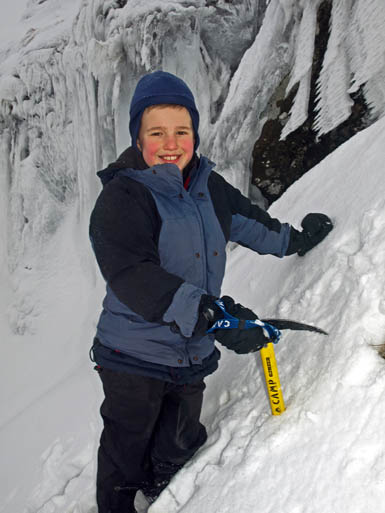
Ben Fleetwood. Photo: John Fleetwood
A 10-year-old schoolboy walked into the record books with his ascent of a Hebridean mountain.
Ben Fleetwood became the youngest person to summit all 283 Scottish munros when he stood at the top of Ben More on Mull.
The Ben More ascent was the final chapter in a story that began with the Kendal boy’s first munro summit: Beinn na Lap, at the age of six. He was already a record breaker, having gained the status of youngest completer of a round of the Wainwrights in the Lake District – since achieved by an even younger walker.
A historic mountain shelter was restored during a weekend of work by volunteers to restore the remote refuge.
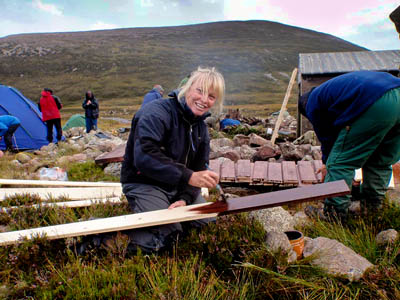
Heather Morning at work on the shelter
The emergency shelter at Fords of Avon in the Cairngorms had fallen into disrepair, but a determined effort by members of the Mountain Bothies Association, Mountaineering Council of Scotland, Glenmore Lodge national outdoor centre and other enthusiasts saw it restored to its former condition.
In September, a volunteer rescue team put one of its vehicles up for sale on eBay, to help pay for its new ambulance.
The Cave Rescue Organisation took delivery of its new Land Rover recently and planned to offer its decommissioned one on the internet auction site to raise cash.
A team of cheeky Three Peaks Challengers asked exhausted mountain rescue volunteers for a lift back to their minibus.
The Wasdale Mountain Rescue Team members were returning to base after a sleepless night spent rescuing a challenger who had fallen 9m (30ft) into a deep gill above Wasdale Head in the Lake District.
Team chair Richard Warren said: “There were still teams of Three Peakers coming off Scafell as the rescue team returned and one team even had the audacity to ask the team minibus to ferry them back to their own minibus, a mile up the road.”
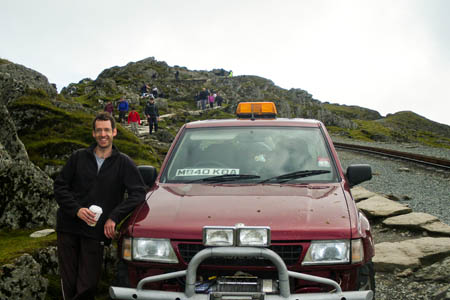
Craig Williams stands beside the maroon Frontera on Snowdon
The appearance, twice, of a maroon Vauxhall Frontera close to the summit of Snowdon led to the appearance in court of 39-year-old Craig Williams, of Gloucestershire, charged with two separate counts of dangerous driving.
GPS may be under threat from a new generation of mobile smartphones, we reported later that month.
The fourth-generation, or 4G, mobile wireless service proposed in the USA would, according to Mark Greaves writing on the Ordnance Survey blog, interfere with the signals used by GPS receivers.
LightSquared, the company behind the proposed service, wants to mix satellite signals with ground-based radio transmitters. It is the latter that would, according to worried GPS users, blitz a large proportion of the sat nav signals, making GPS units either unreliable or, at worst unusable.
A special wedding present was put to good use saving the lives of outdoor enthusiasts.
The unique gift – an off-road vehicle – was passed on by the Duke and Duchess of Cambridge to mountain rescuers following the pair’s marriage in April and put into service on the Lakeland fells.
David Allan, chairman of the organisation, said: “We arranged for the names of the 50 or so teams to be put in a hat and then, on his brother’s behalf, Prince Harry picked out a winner at a recent meeting of the Princes’ Charities Forum,” with the Patterdale team the lucky recipients.
National park planners rejected the controversial bid to build a white-knuckle tourist attraction on a Lake District mountainside.
The proposal, for the longest zip-wire in the northern hemisphere, was thrown out by the national park authority despite support from Everest summiteer and Cumbrian resident Sir Chris Bonington.
Members of Lake District National Park Authority’s development control committee took three hours before turning down the plans, submitted by Honister Slate Mine, by nine votes to five.
By September, the head of England’s largest conservation charity was mobilising its 3.8 million members to challenge the coalition Government’s changes to planning law.
National Trust director-general Dame Fiona Reynolds said the planning reforms threaten the places that are special to people the length and breadth of England.
The Conservative-supporting Daily Telegraph also launched a Hands off Our Land campaign to urge ministers to rethink the proposals, joining the National Trust, English Heritage and the Campaign for the Protection of Rural England in opposing the plans.
Dame Fiona said: “If the countryside or our heritage is under threat, we have a clear responsibility to stand up for it and the people who love it.”
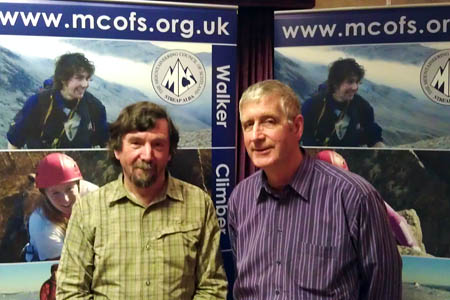
Chris Townsend with new MCofS president Brian Linington. Photo: Mike Dales
The new president of Scotland’s representative mountaineering body said he shared his predecessor’s fears for the country’s upland landscape in the face of increased development.
Brian Linington, who was elected head of the Mountaineering Council of Scotland, also said he wanted to continue the drive to minimise mountaineering incidents by providing advice and improving the skills of hillgoers.
Mr Linington, of Plockton, in Wester Ross, took over from writer and journalist Chris Townsend in the post.
The poisoning of four golden eagles could be just the tip of the iceberg, a conservation charity warned.
The record number of deaths of Britain’s most iconic bird of prey headed a list of shame that included 29 illegally poisoned raptors in one year, according to the Royal Society for the Protection of Birds Scotland.
A spokesperson added: “As many of these crimes were discovered purely by chance, by walkers or birdwatchers, in remote areas of countryside, it’s likely that these figures represent the tip of the iceberg.”
The British Mountaineering Council warned climbers’ rights were at risk if landowners’ objections were accepted on the first section of the proposed English Coast Path.
The BMC was fighting moves to ban climbers from sea cliffs and coastal routes in Dorset which would see rights granted under the Countryside and Rights of Way Act lost under new legislation.
Access and conservation office Rob Dyer, writing on the council’s website, said: “The land in question along this stretch, including the crags, was mapped as open access under CRoW in 2004, with climbing having been a legally allowed activity since that time.
“However, the MCAA supersedes CRoW, meaning that these access rights could potentially be lost if the objections are upheld.”
Two leading outdoors writers threw their weight behind a campaign to stop a windfarm being built 400m outside a national park.
Cameron McNeish joined colleague Chris Townsend, the Mountaineering Council of Scotland’s former president, in the Save the Monadhliath Mountains campaign.
Swindon-based RWE npower renewables wanted to build 31 wind turbines 125m high at the Allt Duine site 8km (5 miles) west of Aviemore, in the Monadhliath Mountains.
Highland Council deferred its decision on the windfarm in December.
Walkers were barred from a Dartmoor beauty spot that has been at the centre of an access battle, after a planning inspector ruled there was no right of way across the land.
Owner Mary Alford closed Vixen Tor to walkers and climbers eight years ago, and the land was excluded from designated open access land under the Countryside and Rights of Way Act.
The Ramblers and the British Mountaineering Council both supported Devon County Council’s order to record two rights of way across the land.
But inspector Mark Yates ruled that there was not enough evidence to show the paths had been used regularly for a period of 20 years.
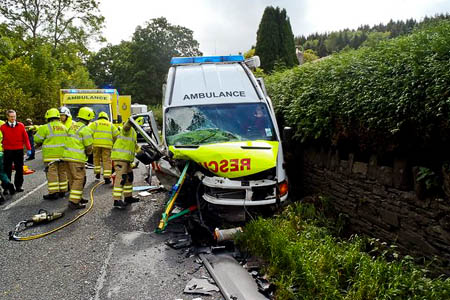
The wrecked team vehicle
Mountain rescuers had a lucky escape after one of their vehicles was wrecked in a crash while on a callout.
The specialist mobile command vehicle for the Brecon Mountain Rescue Team was involved in a three-vehicle collision last weekend during a call out near Builth Wells.
Nigel Dawson, team leader of Brecon MRT, said: “What is most important is that our two team members escaped serious injury. We attend around 100 call outs every year and this vehicle was also central to many other rescues across South and Mid Wales.”
The head of Britain’s biggest walking campaign group announced he was leaving the charity.
The Ramblers’ chief executive Tom Franklin’s post will be taken by keen walker Benedict Southworth in February.
The decision to recommend the enlargement of two English national parks was hailed as a victory for commonsense.
Natural England, the Government’s advisory body on the outdoors, said the Lake District and Yorkshire Dales national park boundaries should be extended.
David Butterworth, the Yorkshire Dales National Park Authority’s chief executive, said: “It’s a real victory for commonsense in looking at national park boundaries in terms of the quality of the landscape rather than outmoded and short-term administrative or political issues.”
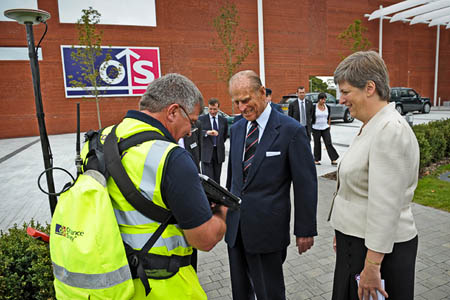
Prince Phillip meets an OS surveyor, with director-general Dr Vanessa Lawrence
In October, the Duke of Edinburgh officially opened the new Southampton headquarters of Ordnance Survey, Britain’s official mapping agency, 42 years since he and the Queen opened the Ordnance Survey’s previous head office.
He said: “I know from just in the ordinary course of events using Ordnance Survey maps what a remarkable service it provides for people all over the country.”
A group of visitors looking at climate change in a national park were caught out by a sudden variation in the local climate as temperatures plunged by 12C overnight.
The delegates from Europe expected the Lake District to be basking in unseasonal 27C heat, but were left shivering when more typical autumn temperatures returned to the national park.
Lake District National Park Authority climate change adviser Becky Willis said: “The delegates were really cold.
“The internet had indicated that last week we’d been experiencing temperatures of 27C, but of course all that had changed by Monday, and our visitors weren’t really dressed for our normal October weather.”

The rocket carrying the satellites takes off. Photo: Stephane Corvaja/ESA/CNES/Arianespace
The first two satellites for the new European rival to the GPS system were successfully launched into orbit today, after a day’s delay.
The pair of Galileo global navigation system satellites were carried into space on one of the oldest rocket systems still operating, a Russian Soyuz craft.
The launch of the two Galileo satellites is the first stage in the establishment of a new, more accurate satellite navigation system that engineers promise will give an accuracy of one metre for outdoor enthusiasts and other users who have compatible receivers.
A controversial plan to reopen a goldmine in a Highlands national park was given the go-ahead.
The Loch Lomond and the Trossachs National Park Authority approved the proposal for the Cononish mine in the shadow of Ben Lui, Scotland’s 28th highest munro.
National park bosses admitted there would be a loss of the Highland glen’s special character, but said there were economic benefits and a long-term conservation improvement.
Linda McKay, national park convener, said: “Without question this has been the largest and most complicated planning application we have ever had to consider.
“As guardians of some of the most stunning scenery in Scotland, it would have been easy to refuse the second application if we were considering the short term impact on the landscape but this national park plans for long term conservation management and that includes having the vision to see beyond the temporary life of the gold mine.
In November, British ultra-runner Lizzy Hawker had to pull out of an ambitious 1,000-mile run across the Himalaya.
Lizzy Hawker’s ‘Sky Dance’ came to an end when she lost a pack containing her satellite phone, maps, compass and permits.
She had aimed to run the 1,600km Great Himalayan Trail traversing Nepal from Kanchenjunga base camp in the east to Hilsa on the western border with Tibet.
The runner said: “On a journey like this communication is vital and without my hard-won permits for the breadth of Nepal there was no option but to stop.”

Dave Turnbull on the summit ice field of Gojung
The boss of the British Mountaineering Council and the president of the Alpine Club successfully summited an unclimbed peak in the Himalaya.
Dave Turnbull, chief executive of the BMC, joined HM Revenue and Customs employee Mick Fowler for the first ascent of 6,310m (20,702ft) Gojung, also known as Mugu Chuli.
Mick Fowler said: “There was wonderful, technically challenging climbing, it was objectively safe, with an unclimbed, eye-catching line leading directly to a similarly unclimbed summit, and there was a different route of descent.”
More mountain rescuers put modern technology and mobile phones to use to help find walkers in separate incidents.
Penrith Mountain Rescue Team found a couple lost on the Pennine Way and a walker on Mardale Ill Bell using software and inbuilt phone GPS receivers to display their positions.
A spokesperson for the Penrith team said: “The Pennine Way incident was the first time the team had used the website link to show the location of a missing person on a computer at the team’s base.
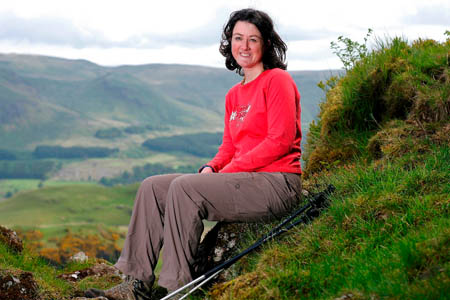
Julie McElroy
A woman who overcame a number of disabilities spoke of her love of the outdoors after gaining the highest level of the John Muir Award.
Julie McElroy’s cerebral palsy resulted in mobility problems, walking difficulties and speech impairment along with manual dexterity problems.
While tackling the four challenges of her award she trekked in the Himalayas, joined the Lomond Mountain Rescue Team on manoeuvre, climbed England’s third-highest mountain Helvellyn, paddled the length of Loch Shiel and led other disabled people on a three-day expedition on Arran.
She said: “I love the outdoors because it allows you to rebalance yourself as a person. I love coming up with new ideas and I wanted to lead by example.”
The Lake District service that provides information about felltop conditions was saved after it was threatened by budget cuts.
The daily reports from the summit of Helvellyn started following the intervention of local sponsors and what the Lake District National Park Authority said was ‘good financial housekeeping’.
The authority, in common with all national parks, is having its budget cut by 29 per cent by the coalition Government, putting the two felltop assessors’ jobs at risk.
Park management team leader Chris Tomlin said: “We are all so pleased that this vital winter service is up and running again.
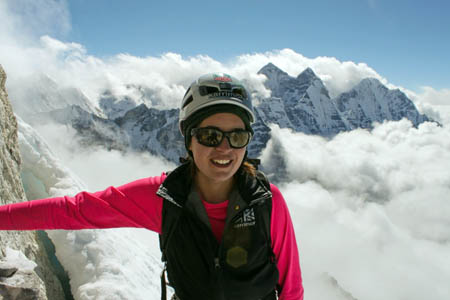
Bonita Norris
Britain’s youngest female Everest summiteer added a third Himalayan peak to her tally.
Bonita Norris successfully climbed Ama Dablam in the company of the same Sherpa who accompanied her to the top of the world’s highest mountain.
She said: “Ama Dablam is the most beautiful mountain I have ever seen,” she said. “I had my doubts whether I would be able to get to the top as it is a challenging climb but when we got onto the mountain things just felt right.”
A new software system for mountain rescuers helped guide a team to a pair lost on a hillside.
The rescue was the second in the weekend to use the Sarloc method of locating walkers via their mobile phone.
Ogwen Valley Mountain Rescue Organisation members were able to make their way straight to a pair of lost walkers, thanks to a system devised by team member Russ Hore.
Chris Lloyd of the team explained: “Mr Lloyd explained how Sarloc operates. “The MRT sends a text with hyperlink details to the casualty’s smartphone,” he said.
“They contact the hyperlink and the location of the smartphone is transmitted to the MRT.”
Wasdale Mountain Rescue Team also used a fix sent by the smartphone carried by a pair of walkers to find them on England’s highest mountain Scafell Pike.
Members of the Lake District Ski Club celebrated the opening of what they believe is England’s second-highest flushing toilet.
The facility, dubbed the Powder Room, sits 750m (2,461ft) up on the flanks of Raise in the Helvellyn range. Only the toilet at the air traffic radome buildings on Great Dun Fell in the northern Pennines is higher, members believe.
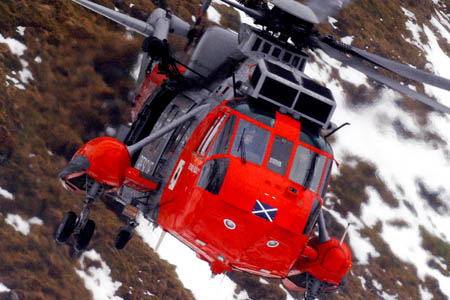
The move will see the end of Royal Navy search and rescue flights over the Highlands
Transport Secretary Justine Greening announced the search and rescue helicopter service operated by the RAF and Royal Navy would be ditched in favour of a privatised civilian scheme.
The decision followed the cancellation of the process set up by the previous Labour Government which would have seen a private finance initiative contract worth £7bn awarded to provide the service, which provides air support for Britain’s volunteer mountain rescue teams.
Ms Greening said: “Looking forward, we are confident that, building on nearly 30 years of civilian service provided under contract to the Maritime and Coastguard Agency, a fully civilian service will be able to maintain the same standards in the future.”
In December, Broadcaster Jeremy Clarkson, already out of favour with public-sector workers, lost any fans he might have had among the hillwalking community.
He said: “I’m not really surprised to hear that the navy and RAF’s rescue services will soon come to an end.
“Politicians say we can’t afford them. Military bigwigs say neither service was set up to rescue Janet Street-Porter if she trips us and gets a hurty ankle.
“I’m afraid I have an objection, too. I don’t mind paying for schools and hospitals because a civilised country must help those who cannot afford to help themselves.”
The board of troubled outdoor retail group Blacks Leisure finally put the company up for sale.
And its directors warned that, with current debt levels of £36m, its shares could be worthless.
The company said it had failed to raise the necessary cash to allow it to continue trading under its current structure.
The panel set up by the coalition Government to look into the future of England’s forests said that all forest and woodland should provide public benefit as well as contributing to the economy.
The Independent Panel on Forestry said there was a continuing need for a national public forest estate in England.
The Bishop of Liverpool, who chaired the panel, said: “Although our panel was born out of fierce debate over the future of the public forest estate, what has become apparent through our work so far is that we must look at the future of all woods and forests, not just the one fifth managed by the Forestry Commission.”
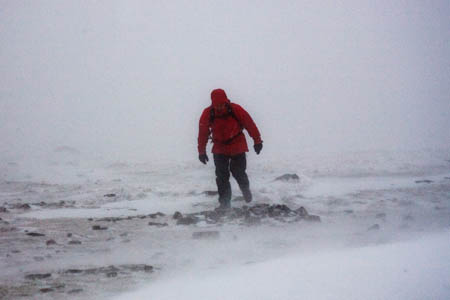
Blizzards and hurricanes hit the Highlands
Hurricane-force winds hit the Highlands early in December, with snow following.
The Met Office forecast gusts of up to 130mph (210kph) on mountains in the western Highlands.
Red alerts were issued warning of severe disruption and possible structural damage in central and southern Scotland, even at valley level.
A gust of 165mph was recorded on Cairn Gorm’s summit.
Five walkers from the Aberdeen area were found safe and well two days ago setting off from the Spittal of Glenshee area during the storms.
Mountain rescuers found the in Glen Doll, unaware they had sparked a major search after taking shelter on lower ground as the hurricanes arrived.
Nine-times Everest summiteer Kenton Cool was chosen as a torch-bearer in the run up to next year’s London Olympic games.
He said his jaw hit the floor when told he was one of thousands of people offered the chance to carry the torch.
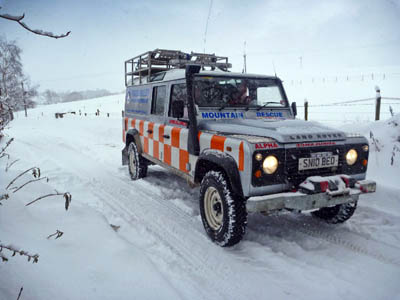
Scottish mountain rescue teams saw their Holyrood Government grant rise
The Scottish Government increased its grant to mountain rescuers by four per cent.
It announced the 27 mountain rescue teams north of the border would jointly receive £312,000 from the Holyrood administration, a rise of £12,000 on the previous year.
Justice Secretary Kenny MacAskill said: “Mountain rescue team volunteers went out more than 500 times last year to seek and rescue those in need of assistance, frequently in difficult mountainous terrain, poor weather conditions and often at night.
“I sincerely thank everyone associated with our mountain rescue teams for providing an outstanding emergency service to the communities in our mountains, hills and rural areas.
Save the Monadhliath Mountains campaigners held a peaceful demonstration outside Highland Council headquarters where they expect the controversial Allt Duine windfarm proposals to be discussed.
The council deferred its decision on the development.
Former Mountaineering Council of Scotland president Chris Townsend is among those supporting the campaign group, which said the planned 31-turbine development is a ‘windfarm too far’.

Some of the sketches in the Wainwright archive. Images: Wainwright estate
The archive of renowned Lakeland guidebook author Alfred Wainwright was opened to the public after a successful bid by Cumbria County Council.
A Heritage Lottery Fund grant of £184,200 enabled the council to bring the collection back to Wainwright’s adopted town of Kendal.
The archive contains annotated maps, notebooks, photographs and extensive slide collection, original pages, sketches and proofs of his books.
The crew of a Royal Navy rescue helicopter described a hair-raising flight in a blizzard in which they plucked an injured walker from a Highland munro.
The pilot and his colleagues from HMS Gannet in Ayrshire had to guide the aircraft to the stricken walker on Beinn Sgulaird in total darkness and swirling blizzards.
Lieutenant Commander Craig Sweeney who was piloting the Sea King said conditions were among the worst they had encountered this year.
The president of the international body for mountaineers stepped down after a vote of no confidence by the association’s management committee.
Canadian Mike Mortimer ends his presidency of the Union Internationale des Associations d’Alpinisme today, 31 December.
Two other executive board members, treasurer Jan Bonding of Denmark and Silvio Calvi of Italy, seen as Mr Mortimer’s closest allies on the board, have also resigned. Mr Calvi also ends his tenure today; Mr Bonding resigned from the board two months ago.
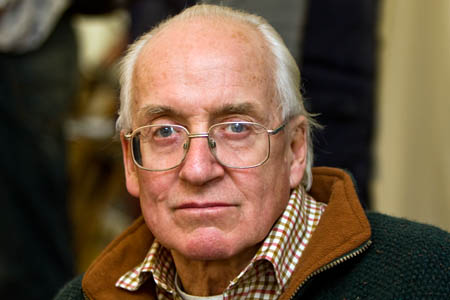
Doug Scott, the BMC's committee member for the UIAA, was instrumental in bringing the no-confidence vote
The vote took place during the UIAA’s general assembly in Kathmandu in October and follows a move by the Doug Scott, the British Mountaineering Council’s elected representative on the committee, who has been critical of the financial controls exercised during Mr Mortimer’s presidency.
And the Met Office revealed 2011 was the second warmest on record, with an average temperature of 9.62C, a sharp rise from last year’s figure of 7.97C, the 12th coldest year recorded.
The official weather body said: “This year marks a return to a trend of warmer than average annual temperatures – all the UK’s top seven warmest years happened in the last decade, with 2006 leading the list with 9.73C.”
The highest single-day temperature for October was also broken, with Gravesend in Kent notching up 29.9C on 1 October, beating the previous record of 29.4C at March in Cambridgeshire on 1 October 1985.
The top temperature in 2011 was 33.1C on 27 June again at Gravesend – the warmest temperature recorded in the UK for five years.
There were marked variations in rainfall in 2011, with Scotland having its wettest year on record with 1,859.5mm of rain – beating the previous record set in 1990.
But some parts of England had very low levels of rainfall – East Anglia had its second driest year on record with 449mm of rain and the Midlands its third driest with 586.5mm.
The coldest temperature was –13C, recorded at Altnaharra in Sutherland on 8 January and, as mentioned above, the strongest gust of wind was 165 mph on Cain Gorm summit on 8 December.
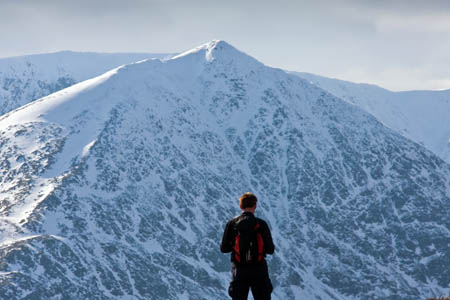
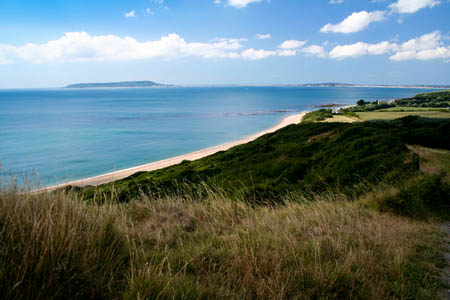
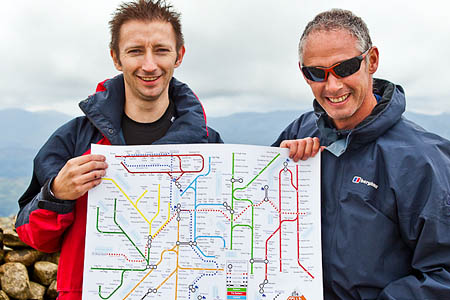
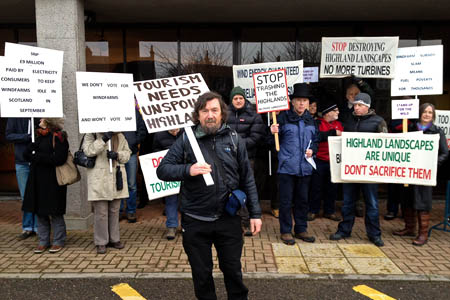
pete stafford and zuna
01 January 2012wonderful read ..keep it up. i will keep reading and looking..
Terry Glover
08 January 2012I have only just stubbled upon your magazine and have found it
an interesting and informative read, there is nothing out there which comes close to what you have produced: well done and thanks.
Www.Gamekeygenz.Com
10 October 2014Hey cool weblog! Guy.. source Great. Exceptional. I most certainly will search for your web blog and grab the provides nourishment to on top of that? I'm content to look for lots of handy data right here while in the upload, we end up needing create a lot more methods normally made available, we appreciate you giving.
Ken Lyon
19 December 2014Too many tragic deaths on here! Why don't you climbers give it a rest? ...it could well be you next!